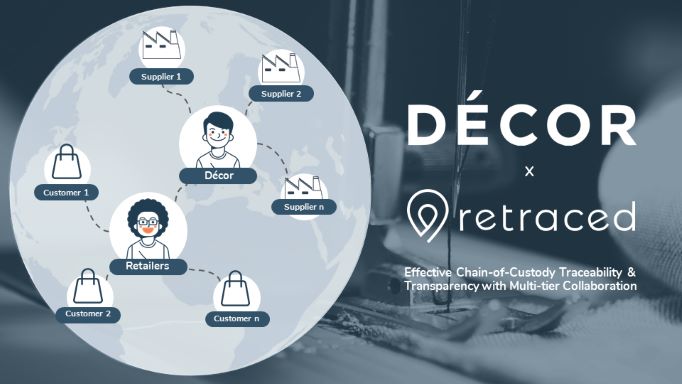
Retraced and Décor have said the partnership is building a chain-of-custody traceability tool that provides retailers and brands greater visibility and transparency into the supply chain and material origin, as well as the ability to retrieve all relevant documents needed to prove fibre provenance.
The partnership will create an enterprise-scale platform solution that helps all relevant supply chain stakeholders trace and collect the verified proof documentation needed for easier risk assessment, reporting, and compliance management. The solution will be fully accessible globally and can be used to assess the provenance of all materials and fibres involved in Decor’s textile manufacturing.
Through the project, Décor and Retraced will help their business partners gain transparency over their products’ supply chains and trace back the fibres and materials to the source. This comes in response to a global call for more responsible textile manufacturing, the firm say.
Décor’s network of strategic supply chain partners, and Retraced’s compliance management platform community of more than 2,000 brands and suppliers, has allowed the two companies to collaborate and create a scalable and digital solution that meets current business needs. The new cascade traceability tool allows users to trace back the production and movement of their garments, and the base materials (e.g. cotton fibre), based on proof documents that establish a verified chain of custody report (e.g. purchase orders, delivery receipts, etc.). The solution also connects all the value chain companies collaborating for the data management and allows them to do so on Retraced’s cloud-based platform, thanks to available APIs and system integrations. This allows the traceability tool to adapt to high order volumes and constantly changing supply chains for all materials involved, and ensures that brands and retailers can get the multi-tier reporting and visibility needed to meet regulatory requirements.
“Ever since we started working with our brand and textile partners back in 2019, we’ve seen that companies need a way to retrace their production footsteps, and find out where their products are made, who makes them and how. Tracing is critical to understanding accountability in supply chains, and we’ve always had this in mind when building retraced,” says Peter Merkert co-founder and CTO of Retraced. “Now regulators and governments are making tracing and risk monitoring a requirement for the industry. This has helped accelerate the need for something business-ready, usable, and scalable…and our platform is ready to deliver. Our partnership with Décor is the perfect launching point for an enterprise-grade traceability solution that skips all the unnecessary and impractical bells and whistles, and goes directly to addressing both an industry-wide transparency problem, and a specific business compliance need.“
The Décor and retraced partnership announcement comes after a successful six-month pilot that started in March 2021. Retraced onboarded Décor’s primary supply chain partners to the Retraced sustainability management platform and helped to start digitising and automating the documentation process. In order to serve both the current regulatory requirements and future market demands of fibre supply chain transparency, the two companies decided to scale the project to ensure that all Décor’s supply chains and materials will be fully traceable.

US Tariffs are shifting - will you react or anticipate?
Don’t let policy changes catch you off guard. Stay proactive with real-time data and expert analysis.
By GlobalDataBy April 2022 the traceability tool will be live, and by August, Décor and Retraced’s partners will be able to access all needed regulatory and compliance information for their supply chains.
Michael Cai, director of operations and supply chain of Décor, adds: Transparency is critical in the ever-evolving dynamics of the fashion industry. In addition to the regulatory requirements in different countries to which we ship goods, the global end consumer is also raising their expectations of how a product is made and what it is made from. Responsible sourcing practices and transparent supply chains are not trends; they are the expectation. For a company that sources and produces materials all over the world, it’s our job within the value chain to lead by example and bring our supply chain partners along on the journey. To Decor, this isn’t about compliance. It’s about being a global role model.
“We see significant potential in retraced and their platform. This partnership not only allows us to be more proactive and automated in our supply chain data management, but it also enables us to provide instantaneous traceability details to our brand and retail partners through a robust reporting capability. What may have taken days of searching through and consolidating documents can now be pulled in seconds.”
Retraced CPO and co-founder Philip Mayer also points out the potential for this partnership to promote better standards in the industry.
“To be clear, a more sustainable and responsible fashion industry doesn’t start or stop with government regulations. Nor will it be solved with just one company or solution. We need a more systemic change in how we produce garments, and how our choices impact the people involved. We need to empower more stakeholders with information that can help make better choices.
“Transparency is about having the right data at the right time. Our collaboration with Décor is helping to trace, evaluate and prove the relevant textile and fiber data that you need, when you need it. Ultimately, we hope that practical partnerships like ours will help build the blueprint for better sustainability standards in today’s fashion and textile supply chains.”



